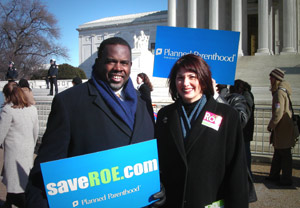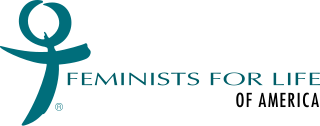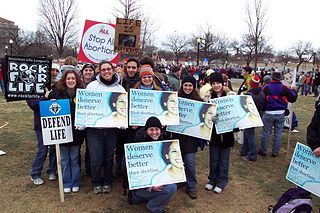
The United States abortion-rights movement is a sociopolitical movement in the United States supporting the view that a woman should have the legal right to an elective abortion, meaning the right to terminate her pregnancy, and is part of a broader global abortion-rights movement. The movement consists of a variety of organizations, with no single centralized decision-making body.
Libertarians promote individual liberty and seek to minimize the role of the state. The abortion debate is mainly within right-libertarianism between cultural liberals and social conservatives as left-libertarians generally see it as a settled issue regarding individual rights, as they support legal access to abortion as part of what they consider to be a woman's right to control her body and its functions. Religious right and intellectual conservatives have attacked such libertarians for supporting abortion rights, especially after the demise of the Soviet Union led to a greater divide in the conservative movement between libertarians and social conservatives. Libertarian conservatives claim libertarian principles such as the non-aggression principle (NAP) apply to human beings from conception and that the universal right to life applies to fetuses in the womb. Thus, some of those individuals express opposition to legal abortion. According to a 2013 survey, 5.7/10 of American Libertarians oppose making it more difficult for a woman to get an abortion.
Reproductive Freedom for All, formerly NARAL Pro-Choice America and commonly known as simply NARAL, is a non-profit 501(c)(4) organization in the United States that engages in lobbying, political action, and advocacy efforts to oppose restrictions on abortion, to expand access to abortion and birth control, and to support paid parental leave and protection against pregnancy discrimination.

Feminists for Life of America (FFL) is a non-profit, anti-abortion feminist, non-governmental organization (NGO). Established in 1972, and now based in Alexandria, Virginia, the organization publishes a biannual magazine, The American Feminist, and aims to reach young women, college students in particular.
Care Net is an evangelical Christian network of crisis pregnancy centers operating primarily in the United States. As an anti-abortion organization, its centers seek to persuade women not to have abortions. Headquartered in Northern Virginia, it is one of the nation's two largest networks of crisis pregnancy centers.
Heartbeat International is an international anti-abortion association that supports the largest network of crisis pregnancy centers (CPC) in the world, with over 2,000 affiliates in 50 countries. It does not offer, recommend, or refer for abortions. It describes itself as an "interdenominational Christian association". Heartbeat International teaches its affiliated members to make their advertising look as though they are full-service reproductive health clinics that provide referrals for birth control or abortion. Staff are also trained on how to discourage pregnant women from accessing abortion, and how to discourage young women from using emergency contraception, birth control pills, or IUDs. Heartbeat staff are also encouraged to create two websites, one that has an explicitly Christian message, and one that looks like Planned Parenthood. Many pregnancy centers have the ultimate goal of converting women through a born-again experience to "save the mother, save the baby".

A crisis pregnancy center (CPC), sometimes called a pregnancy resource center (PRC) or a pro-life pregnancy center, is a type of nonprofit organization established by anti-abortion groups primarily to persuade pregnant women not to have an abortion. In the United States, CPCs that qualify as medical clinics may also provide pregnancy testing, sonograms, and other services, while many others operate without medical licensing under varying degrees of regulation.

The United States anti-abortion movement contains elements opposing induced abortion on both moral and religious grounds and supports its legal prohibition or restriction. Advocates generally argue that human life begins at conception and that the human zygote, embryo or fetus is a person and therefore has a right to life. The anti-abortion movement includes a variety of organizations, with no single centralized decision-making body. There are diverse arguments and rationales for the anti-abortion stance. Some anti-abortion activists allow for some permissible abortions, including therapeutic abortions, in exceptional circumstances such as incest, rape, severe fetal defects, or when the woman's health is at risk.
Pregnancy options counseling is a form of counseling that provides information and support regarding pregnancy. Women seeking pregnancy options counseling are typically doing so in the case of an unplanned or unintended pregnancy. Limited access to birth control and family planning resources, as well as misuse of birth control are some of the major contributing factors to unintended pregnancies around the world. In 2012, the global rate of unintended pregnancies was estimated to be 40 percent, or eighty-five million pregnancies.

Americans United for Life (AUL) is an American anti-abortion law firm and advocacy group based in Washington, D.C. Founded in 1971, the group opposes abortion, euthanasia, assisted suicide, embryonic stem cell research, and certain contraceptive methods. The organization has led campaigns and been involved in judicial actions to prevent the passage and implementation of legislation that permits abortion, or may increase prevalence of abortion, including successfully defending the Hyde Amendment in the U.S. Supreme Court.
Abortion in Israel is permitted when determined by a termination committee, with the vast majority of cases being approved as of 2019. The rate of abortion in Israel has steadily declined since 1988, and compared to the rest of the world, abortion rates in Israel are moderate. According to government data, in Israel, abortion rates in 2016 dropped steadily to 9 per 1,000 women of childbearing age, lower than England (16.2) and the United States (13.2). 99% of abortions are carried out in the first trimester. Despite allegations of permitting abortion under limited circumstances, Haaretz noted in 2019 that this is not the case and abortion is almost always permitted in Israel.
Leslee Unruh is an American anti-abortion advocate and public speaker. Since 1983, she has been active in the anti-abortion movement and abstinence until marriage movement with organizations based in South Dakota. She has been vocal in state and national government, previously serving as Executive Director to the VoteYesForLife.com campaign.
Abortion in Guyana is legal during the first eight weeks of pregnancy, but it is illegal after eight weeks except in cases of endangering the maternal or fetal health. Throughout much of the 20th century, it was officially illegal but rarely were laws against abortion ever enforced. In 1995, legislation was passed which made abortion legal as long as it was done within the first 8 weeks of pregnancy and done with the consent of the pregnant woman and by a licensed medical practitioner.
Abortion in China is legal throughout pregnancy and generally accessible nationwide. Abortions are available to most women through China's family planning programme, public hospitals, private hospitals, and clinics nationwide. China was one of the first developing countries to permit abortion when the mother’s health was at risk and make it easily accessible under these circumstances in the 1950s. Following the Chinese Communist Revolution and the proclamation of the People's Republic of China in 1949, the country has periodically switched between more restrictive abortion policies to more liberal abortion policies and reversals. Abortion regulations may vary depending on the rules of the province. In an effort to curb sex-selective abortion, Jiangxi and Guizhou restrict non-medically necessary abortions after 14 weeks of pregnancy, while throughout most of China elective abortions are legal after 14 weeks. Although sex-selective abortions are illegal nationwide, they were previously commonplace, leading to a sex-ratio imbalance in China which still exists.

The Dominican Republic is one of 24 countries in the world and one of six in Latin America that has a complete ban on abortion. This complete ban includes situations in which a pregnant person’s life is at risk.

Abortion-rights movements, also self-styled as pro-choice movements, advocate for the right to have legal access to induced abortion services including elective abortion. They seek to represent and support women who wish to terminate their pregnancy without fear of legal or social backlash. These movements are in direct opposition to anti-abortion movements.

Anti-abortion movements, also self-styled as pro-life or abolitionistmovements, are involved in the abortion debate advocating against the practice of abortion and its legality. Many anti-abortion movements began as countermovements in response to the legalization of elective abortions.
Abortion is the termination of human pregnancy, often performed in the first 28 weeks of pregnancy. In 1973, the United States Supreme Court in Roe v. Wade recognized a constitutional right to obtain an abortion without excessive government restriction, and in 1992 the Court in Planned Parenthood v. Casey invalidated restrictions that create an undue burden on people seeking abortions. Since then, there has continued to be an abortion debate in the United States, and some states have passed laws in the form of regulation of abortions but which have the purpose or effect of restricting its provision. The proponents of such laws argue they do not create an undue burden. Some state laws that impact the availability of abortions have been upheld by courts. In 2022, Roe and Casey were overturned by the Supreme Court in Dobbs v. Jackson Women's Health Organization, meaning that states may now regulate abortion in ways that were not previously permitted.
Nuala Ann Scarisbrick, was co-founder in 1970, with her husband Jack Scarisbrick, and National Administrator of Life, a British anti-abortion charity.








